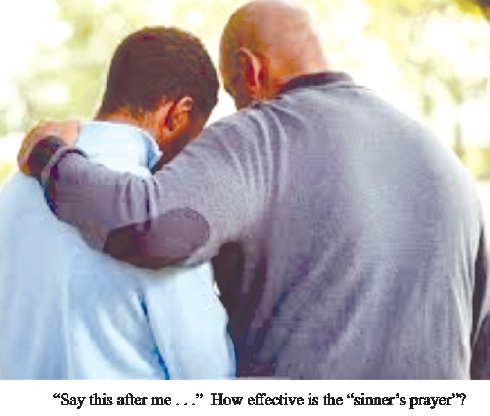The most critical condition for the Christian life is the state of being saved. “Saved” or “being saved” is the initial point of entry into our relationship with God. Other expressions are “born again” or “new life”.
Thus, every evangelistic message is meant to guard a person into believing in Christ and accepting him as Lord and Saviour in order to obtain the salvation of their soul.
Scripture supports it
The scriptures that support this notion include: “To all who received him, who believed in his name, he gave the right to become children of God” (John 1:12). Another is: “Believe in the Lord Jesus and you will be saved . . .” (Acts 16:31).
And, as we’ve been discussing, the actions of “believing” and “receiving” must include repentance. “Repent, for the Kingdom of God is at hand,” Jesus said. Note, therefore, the three words that explain how to receive salvation in Jesus: believe, repent and receive.
Paul summarises it this way: “For it is with your heart that you believe and are justified (accepted by God), and it is with your mouth that you declare your faith and are saved” (Romans 10:9). The “heart” and “mouth” collaboration is quite instructive.
Now, how does a person “believe” in Jesus and “receive” him in order to obtain salvation? It is through a declaration, as Paul said, with heart and mouth. This is where the “sinner’s prayer” comes in.
The sinner’s prayer
The sinner’s prayer, which is practised in all Christian jurisdictions, encourages a person to: 1. acknowledge that they are sinful by nature and practice; 2. believe that God sent his Son Jesus to die for us; 3. repent of their sinfulness; 4. ask God to forgive them and cleanse them through Jesus; 5. invite Jesus into their heart (and life), and 6. declare their willingness to follow Jesus all their life.
When leading a person to receive Jesus as Lord and Saviour, we encourage them to say this “sinner’s prayer” after us.
The idea is that the person, being new to the Christian faith, may not be able to express their conviction, belief, faith, repentance and acceptance. Hence, we help by asking them to say a “sinner’s prayer” after us.
Like Apostles’ Creed
A person who desires salvation and repents ought to be able to say what is on their heart. But if the person is unable to articulate their conviction, helping them to make the declaration is appropriate.
In fact, that is the reason behind prayer and worship books that many churches use during service. Reciting the Apostles’ Creed to affirm our faith and the marriage vows couples make are examples of personal declarations based on what is written or spoken for us to follow.
Anybody who sincerely and genuinely repeats the sinner’s prayer has received salvation and is the child of God according to scripture. They have moved from being “unbelievers” to becoming “believers” and are “born again” (2 Corinthians 5:17).
The challenge
Here is the challenge: Is the person who repeats the sinner’s prayer truly repentant? Or have they only repeated the words without understanding?
Since the person didn’t form the statements on their own accord, in accordance with their convictions, does simply saying a sinner’s prayer make the person a recipient of God’s salvation?
In truth, no one can authenticate the genuineness of the person who comes forward to receive Christ. Hence, we do this “sinner’s prayer” by faith, trusting that the person praying it means what they are saying and that the Holy Spirit will convict them and give them understanding.
Follow-up is key
That is why the new convert is encouraged to join a Bible-believing church for Bible studies, prayer and fellowship in order to grow in their faith. Follow-up is crucial for bringing up a new convert so that what they lacked initially would be made up as they grow in the Lord.
In any case, repentance is not just one event that takes place at the time a person receives Jesus as Lord and Saviour. Throughout our life, whenever the Holy Spirit convicts us of sin, we must repent, ask for forgiveness and turn away from doing wrong.
Like building a house
The wise person, which includes whoever receives Jesus as Lord and Saviour, has built their “house” on the solid Rock of Christ.
After building the house, you don’t need to “re-build” it when there is a leakage, a crack or paint peeling off; rather, you undertake the regular maintenance required.
Similarly, we receive Jesus once, and thereafter continue walking with him. We don’t “receive” him over and over again.
When we fall into sin, we don’t need to “re-invite” Jesus into our life, because he is already with us. Rather, we genuinely repent, ask for forgiveness, turn away from the wrongdoing and continue our walk with him.

